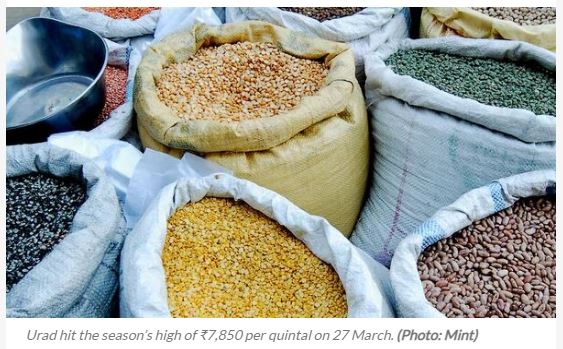Pulse prices soar, importers hoard Myanmar purchases
New Delhi: Importers of tur and urad are not bringing their purchases from Myanmar to India. Instead, they are hoarding the pulses to book profit amid rising prices in the domestic market, two senior government officials aware of the development said.
Prices of mill-quality tur (arhar or pigeon peas) and urad (black gram) jumped in the March quarter and are expected to rise further, driven by an anticipated shortage in domestic market.
Wholesale mill-quality tur and urad are trading at ₹8,000-8,500 a quintal in the key markets of Akola and Latur, Maharashtra and ₹7,000-8,000 per quintal in Rajkot and Ahmedabad, Gujarat, and Guntur in Andhra Pradesh, according to spot traders. Prices of kharif pulses, mainly tur, have rallied this season due to tight supply, and since February prices have increased about 13%. On 28 March, tur prices had hit a record of ₹8,900 a quintal in Akola. Urad hit the season’s high of ₹7,850 per quintal on 27 March in Guntur.

A quintal is 100 kilograms.
“Indian import companies have reportedly hoarded around 150,000 tonnes of tur and about 200,000 tonnes of urad in Myanmar to book profit,” said one of the government officials cited above. “We have written to the Indian high commission in Myanmar to investigate the issue with local authorities and ensure that there is no hoarding, and we have been checking with them regularly.”
The Centre is closely monitoring stock disclosures of tur and urad by importers, traders and millers to ensure that there is no hoarding, which could create panic in the market and push up prices. It has directed states to take strict action for undisclosed stocks. The average retail price of tur at the pan-India level is ₹116.77 a kg, while urad is ₹108.70 per kg, according to the consumer affairs department’s price monitoring division. “The concern lies more with tur as prices have shot up sharply amid concerns over tight supply,” the second government officer said.
“Supply tightness is there in the domestic market, but it is just a matter of four months. Supply situation in the domestic market is expected to ease with the arrivals from East African countries from August onwards.” Indian importers may be hoarding as they expect a delay in arrival of tur from East Africa, said a market official requesting anonymity. Excessive rains in March in Mozambique and Malawi had delayed tur cultivation by 20-25 days, and this is likely to delay shipments by at least a month.
Tur shipments from East African countries usually arrive in August. “Importers are ready to incur holding and carry costs as they expect to gain more profit when the lean season reaches the peak ahead of the likely shipment delay from East African nations,” a market official said.
“If prices rise by another ₹10-12 per kg at the retail level, we may release tur from the central pool to cool down prices, and we have sufficient stock,” the second government official said. If this measure does not help, the government might consider imposing stock limit. In order to stabilize tur and urad prices, the government has started procuring imported varieties. Procurement had been stopped in December as fresh crops arrived in the domestic market. “Government procuring agencies like NAFED and National Cooperative Consumers’ Federation of India are receiving bids for 5,000-10,000 tonnes of tur every day, but they have not made any purchases,” the first government official said.
With this measure, prices of tur and urad have started stabilising in the wholesale markets.
Tur and urad account for two-thirds of the total kharif pulses production and have a share of over 70% in India’s pulses import basket.
With this measure, prices of tur and urad have started stabilising in the wholesale markets.
Tur and urad account for two-thirds of the total kharif pulses production and have a share of over 70% in India’s pulses import basket. India is heavily dependent on imports to meet its domestic consumption. India imports most of its tur dal from Myanmar and East African nations such as Malawi, Mozambique and Tanzania among others, while urad dal is mostly purchased from Myanmar and to some extent from United Arab Emirates.
In the last financial year ended March, imports of tur were 5% lower year-on-year at 784,191 tonne and urad imports declined 21% to 487,726 tonnes.
Source: https://www.livemint.com/news/india/indian-importers-hoard-tur-and-urad-from-myanmar-to-book-profits-11681928147131.html


 Thailand
Thailand




